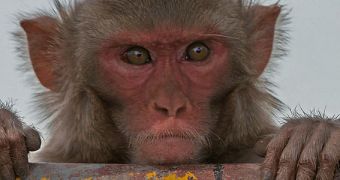According to the conclusions of a 25-year study, rhesus macaque (Macaca mulatta) monkeys that consume a reduced-calorie diet live longer than peers that are allowed to consume as much food as they want. Scientists with the Wisconsin National Primate Research Center (WNPRC) at the University of Wisconsin say that these results could be applicable to humans as well.
The research began in 1989, and focused on two groups of monkeys. Members of the first were kept on a strict diet featuring very few calories, while macaques in the second group were allowed to eat as much as they wanted. Monkeys in the first group were two times less likely to die at any age than peers in the control group, which indulged in food at will.
Each group included 38 members, surveyed thoroughly throughout the study period, says UW biochemist Rozalyn Anderson, the leader of the new investigation. Details of the work were published in the April 1 issue of the top scientific journal Nature Communications. She also authored a 2009 paper revealing that monkeys on calorie-restricted diets did not die of age-related causes as often.
At the time that paper came out, Anderson and her team could not accurately gage the effect reducing calories had on survival rates, since not enough monkeys had died of any type of causes in 2009. Nearly 5 years later, the group was able to collect sufficient data to present an accurate conclusion, Nature News reports.
“We set out to test the hypothesis: would calorie restriction delay aging? And I think we've shown that it does,” the team leader explains. Previous studies have shown a similar effect of reduced calorie intake on mice, but no research has until now been conducted on animals very closely related to humans. These diets are believed to trigger a biochemical pathway that promotes survival.
The international scientific community has yet to arrive at a consensus about what that pathway might be, how it might looks like, and whether or not humans have it at all. For example, a study released in 2012 by experts with the US National Institute on Aging (NIA) in Bethesda, Maryland, has shown that monkeys do not survive for longer when on restricted diets.
“The publication of the 2012 paper created such consternation. [The new study proves that] absolutely, calorie restriction does work. I have no doubt the results will be relevant to how we're treating people in geriatric clinics ten years from now,” Anderson comments. The leaders of the NIA study have already seen the new results, but they are more cautious in their analysis of the results.
“Are we seeing health benefits? Yes, but I don’t know that we're necessarily seeing survival benefits. I think what we're arriving at is that the effects of calorie restriction on survival are very dependent on genetics, the environment and the effect on body weight, and probably the diet that you give the animals,” NIA physiologist Julie Mattison comments.

 14 DAY TRIAL //
14 DAY TRIAL //